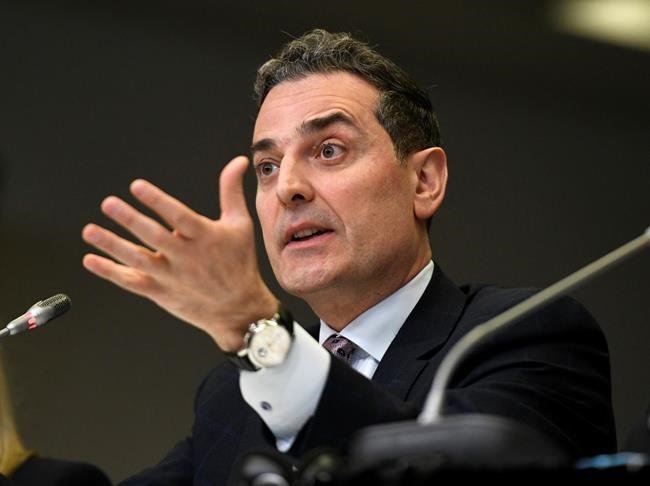Bell Mobility: CRTC’s MVNO proposal is ‘highly aggressive,’ puts spending at risk
Advertisement
Read this article for free:
or
Already have an account? Log in here »
We need your support!
Local journalism needs your support!
As we navigate through unprecedented times, our journalists are working harder than ever to bring you the latest local updates to keep you safe and informed.
Now, more than ever, we need your support.
Starting at $15.99 plus taxes every four weeks you can access your Brandon Sun online and full access to all content as it appears on our website.
Subscribe Nowor call circulation directly at (204) 727-0527.
Your pledge helps to ensure we provide the news that matters most to your community!
To continue reading, please subscribe:
Add Brandon Sun access to your Free Press subscription for only an additional
$1 for the first 4 weeks*
*Your next subscription payment will increase by $1.00 and you will be charged $20.00 plus GST for four weeks. After four weeks, your payment will increase to $24.00 plus GST every four weeks.
Read unlimited articles for free today:
or
Already have an account? Log in here »
Hey there, time traveller!
This article was published 19/02/2020 (2152 days ago), so information in it may no longer be current.
GATINEAU, Que. – Canadian consumers won’t get better deals on wireless data if mobile virtual network operators are introduced into an already competitive market, but such a move would slow an ongoing major upgrade to the national communication backbone, Bell Canada and Bell Mobility executives testified Wednesday.
Speaking at the second day of public hearings before the Canadian Radio-television and Telecommunications Commission in Gatineau, Que., Bell Canada chief executive Mirko Bibic said any form of MVNO mandate would an “aggressive” regulatory intervention.
Bibic reminded CRTC commissioners that Canada is taking “the next big step” in building its communications backbone, which requires simultaneously installing ultra-fast fifth-generation wireless networks and more fibre optic infrastructure.

“Those are two fundamental things for the next generation of the Canadian economy,” Bibic said.
“We should not be taking risks with the pace and extent of 5G deployment in Canada.”
The CRTC departed from its usual approach of preferring “facilities-based” networks when its said last year that it was in favour of mandated MVNO access to the national networks owned by Bell, Telus and Rogers.
Historically, successive Liberal and Conservative governments and the CRTC have favoured facilities-based network operators because they build and operate most of the country’s telecom infrastructure.
Bibic, and other Bell executives who flanked him at the CRTC hearing, said Canada’s wireless market is more competitive than it has ever been.
“Clearly the evidence shows that over a relatively short . . . period of time, prices in Canada are declining rapidly and there’s more and more value being delivered. … And, I say, now’s not the right time (for MVNOs).”
Although Bell and its rivals seldom refer to each other by name in public discussions, Bibic’s team was lavish with its praise of the progress of Quebecor’s Videotron — a cable company that entered the wireless market about 10 years ago.
“I think we have to give credit to the work that Videotron has done,” said Claire Gillies, president of Bell Mobility.
She said Bell had to adapt its pricing strategy in Quebec as Videotron became a “bigger competitive threat for us.”
Quebec has some of Canada’s most competitive pricing.
“Quebec is a great example of where a regional carrier has really risen to the occasion. . . . They now contribute nearly one-third of all the net (subscriber) additions in Canada.
“They have their feet firmly on the ground and have made us better.”
Bell also credited to Freedom Mobile — the wireless arm of Calgary-based Shaw Communications — for its introduction of the Big Gig plan in 2017. Big Gig features large amounts of data without additional fees for going over monthly limits.
CRTC vice-chair Christianne Laizner asked Bell why the Big Three carriers began to offer “unlimited” mobile plans last summer, suggesting they had been accused of doing so to avoid having MVNOs added to their list of competitors.
Robert Malcolmson, Bell’s chief regulatory officer, said the introduction of unlimited plans “had nothing to do with the regulatory proceedings.”
“It was one of many responses to what’s increasingly a competitive marketplace,” Malcolmson said.
“For example, when Freedom introduced their Big Gig plan, the national carriers responded. And then a national carrier (Rogers) decided to introduce unlimited prices and again the market responded.
“That’s indicative of the level of competitive intensity we see. And it’s benefitting consumers.”
Bell Mobility was the first of the Big Three national carriers to testify at nine days of CRTC hearings. A delegation from Telus is scheduled to appear Thursday and Rogers will appear next week.
On Tuesday, delegations from both the Canadian government’s Competition Bureau and Shaw Communications said the introduction of MVNOs would making it harder for the country’s regional carriers to compete with the three national carriers — which already account for about 90 per cent of the wireless market.
Trevor English, Shaw’s chief financial and corporate development officer, said that the CRTC’s preliminary support for mandated MVNO access, announced shortly before a critical spectrum auction last year, came as a “shock.”
“It called into question many of our assumptions, and caused changes to our auction plans, including pulling back on ambitions to expand into new markets,” English testified Tuesday.
This report by The Canadian Press was first published Feb. 19, 2020.
— by David Paddon in Toronto.
Companies in this story: (TSX:BCE, TSX:RCI.B, TSX:QBR.B, TSX:T, TSX:SJR.B)
Note to readers: This is a corrected story. An earlier version gave Robert Malcolmson’s first name as Roger.
